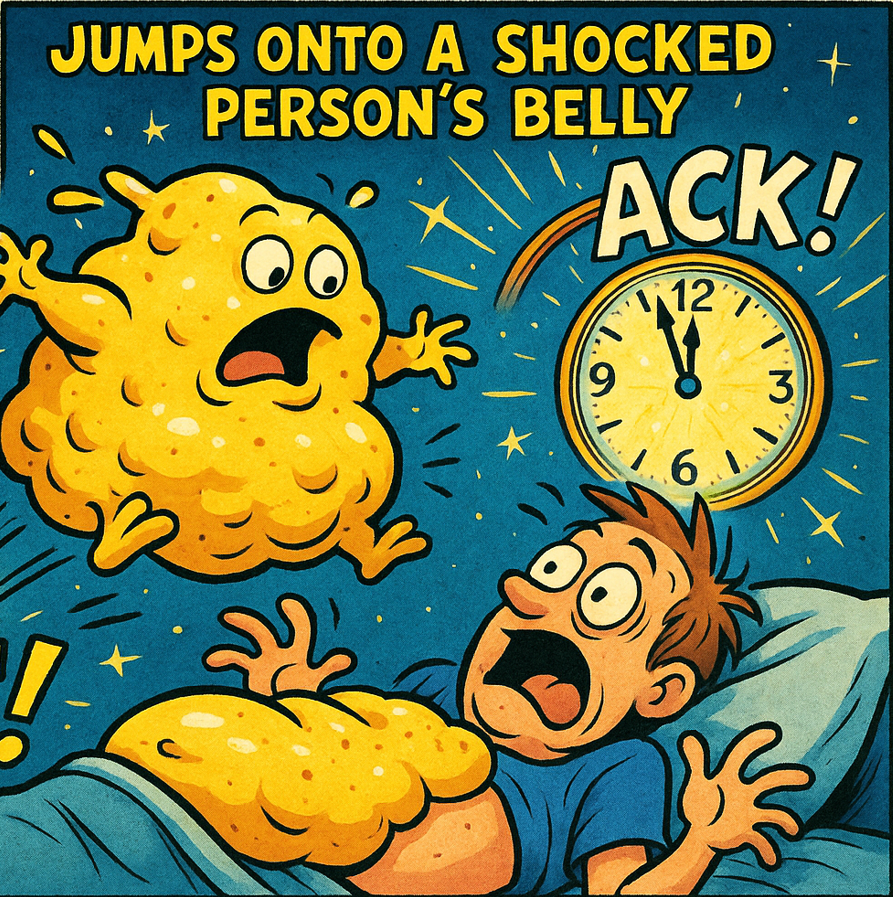Nutrition Myth #3: Eating Late at Night Makes You Fat
Many believe eating after 8 p.m. causes fat gain, but science shows it’s total calories that matter. Learn why late-night snacking can lead to overeating, how protein before bed helps recovery, and what the real takeaway is.
NUTRITION
Adi English
3 min read


🌙 Nutrition Myth #3: “Eating Late at Night Makes You Fat”
📖 Article (~350 words)
So apparently, food has a bedtime now. People swear if you eat after 8 p.m., the calories sneak into your body and immediately set up camp on your belly. Like, what is this, Cinderella? Does a sandwich magically turn into fat at midnight when the clock strikes twelve? If that were true, night-shift workers would all be shaped like refrigerators.
Here’s the truth: eating late at night does not make you fat. Eating too many calories makes you fat. Your body doesn’t check the clock before it decides what to do with food. It only checks whether you’re in an energy surplus or deficit.
Now, let’s add nuance. Eating late can be a problem for some people, but not for the reason they think. When you eat late, you’re often more likely to overeat—grabbing snacks while watching Netflix, raiding the fridge after a stressful day. Those “innocent” late-night chips or ice cream bowls easily push you over your daily target. So why do people think eating late causes fat gain? Because late-night eating often means snacking on high-calorie, processed foods like chips, ice cream, or pizza. It’s not the time, it’s the calories and the food choices.
There’s one exception: eating very close to bedtime might affect sleep quality, especially if you eat heavy, greasy meals. Poor sleep can mess with hormones like ghrelin and leptin, which regulate hunger. That can make you eat more the next day. But again - it’s about behavior and calories, not the clock. Your body doesn’t know what time it is; it only knows energy balance.It’s not the clock making you fat—it’s you eating Doritos like they’re oxygen.
From a performance standpoint, timing matters for athletes. A small snack with protein and carbs before bed can actually help with recovery and muscle growth. Studies show casein protein, for example, digests slowly overnight and supports muscle repair.
At the end of the day, it’s not the hour that matters; it’s the extra slice of pizza. The calories count the same whether you eat them at 7 a.m. or 11 p.m.
Takeaway: Eating late doesn’t magically make you fat. Going over your calorie needs does. So stop blaming the clock—blame the extra calories.
🗂 Vocabulary
Calories – units of energy in food.
Simple: The fuel that gives your body energy.
Example: This snack has 200 calories.
Student example: ____________
Energy surplus – when you eat more calories than you burn.
Simple: Extra food that the body stores as fat.
Example: An energy surplus leads to weight gain.
Student example: ____________
Deficit – when you eat fewer calories than you burn.
Simple: Eating less than your body uses.
Example: A calorie deficit helps with weight loss.
Student example: ____________
Overeat – to eat more food than your body needs.
Simple: Eating too much.
Example: He tends to overeat while watching TV.
Student example: ____________
Protein – a nutrient that builds and repairs muscles.
Simple: Found in meat, eggs, beans, dairy.
Example: Protein helps muscles grow.
Student example: ____________
Carbs – short for carbohydrates, nutrients that give the body energy.
Simple: Rice, bread, pasta, fruit.
Example: Carbs fuel your workouts.
Student example: ____________
Recovery – how your body heals and gets stronger after stress or exercise.
Simple: Rest and food that help muscles heal.
Example: Protein before bed helps recovery.
Student example: ____________
Casein protein – a slow-digesting protein found in milk.
Simple: Protein from dairy that works overnight.
Example: Casein protein supports recovery while you sleep.
Student example: ____________
Performance – how well you can do an activity or sport.
Simple: Your ability to train or compete.
Example: Eating well improves performance.
Student example: ____________
Takeaway – the most important lesson or point.
Simple: The main thing to remember.
Example: The takeaway is that eating late doesn’t cause fat gain.
Student example: ____________
📝 Exercises
Comprehension
Why do some people think eating late makes you fat?
What really causes fat gain?
Why can late-night eating lead to overeating?
How can protein before bed actually help?
What is the takeaway from this article?
Multiple Choice
What does your body check when deciding fat gain?
a) The clock b) Calories c) Mood d) Weather
Which is a slow-digesting protein helpful at night?
a) Whey b) Casein c) Soy d) Pea
Why do people often eat more at night?
a) They’re bored b) They’re usually more active
c) They overeat snacks d) Calories don’t count at night
Which nutrient builds muscle?
a) Fat b) Fiber c) Protein d) Sugar
What does “takeaway” mean?
a) A fast-food meal b) The main lesson c) A food delivery app d) The final calories
Fill in the Blank
Eating too many ______ leads to weight gain.
An energy ______ happens when you eat more than you burn.
A calorie ______ helps with weight loss.
Protein helps with ______ after training.
The main ______ is that timing doesn’t cause fat gain.
True/False
Eating late at night magically makes you fat.
Calories matter more than the clock.
Casein protein digests quickly.
Overeating is common during late-night snacking.
The article says never eat after 8 p.m.
Discussion
Do you ever eat late at night? Why?
What foods do you usually snack on at night?
Do you think timing or total calories matter more?
Have you tried eating protein before bed for recovery?
What is your personal takeaway from this article?
